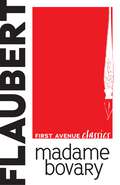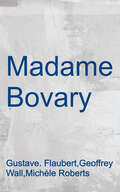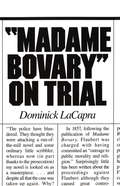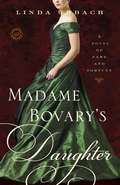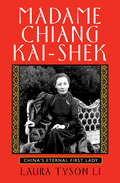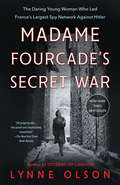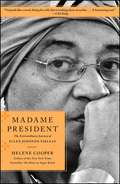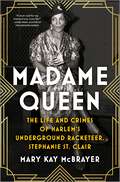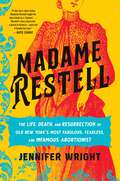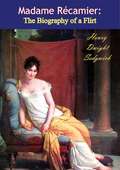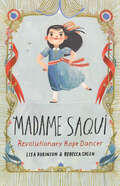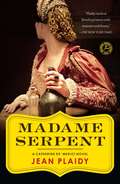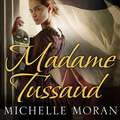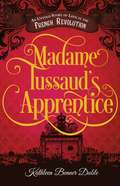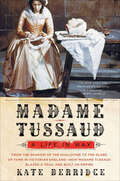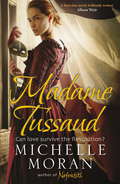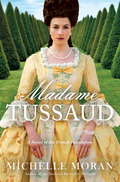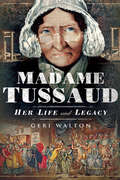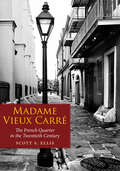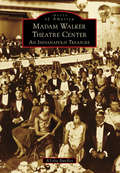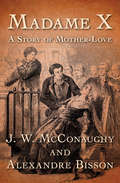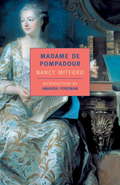- Table View
- List View
Madame Bovary (First Avenue Classics ™)
by Gustave FlaubertEmma dreams of sophistication, wealth, and romance, but what she gets is a marriage to Charles Bovary, a provincial, middle-class doctor who is a devoted but boring husband. She tries her hardest to be a loyal and loving wife, even as she grows to resent him more and more for his insufferable dullness. Soon, though, she is seduced by the dashing Rodolphe and gives into her desires. In their affair, Emma believes she has finally found true, passionate love. She borrows money to lavish Rodolphe with expensive gifts, and the neighbors begin to gossip about her indiscretion. When the moneylender comes to collect and Rodolphe leaves her, where will Emma turn? This tragic romance by Gustave Flaubert was first published in French in 1857. This is an unabridged version taken from the 1886 translation by Eleanor Marx-Aveling.
Madame Bovary (Penguin Classics Ser.)
by Geoffrey Wall Michèle Roberts Gustave. FlaubertThe notorious and celebrated novel that established modern realism For this novel of French bourgeois life in all its inglorious banality, Flaubert invented a paradoxically original and wholly modern style. His heroine, Emma Bovary, a bored provincial housewife, abandons her husband to pursue the libertine Rodolphe in a desperate love affair. A succès de scandale in its day, Madame Bovary remains a powerful and scintillating novel. This Penguin Classics edition is translated with notes and an introduction by Geoffrey Wall. It includes a preface by Michele Roberts. For more than seventy years, Penguin has been the leading publisher of classic literature in the English-speaking world. With more than 1,700 titles, Penguin Classics represents a global bookshelf of the best works throughout history and across genres and disciplines. Readers trust the series to provide authoritative texts enhanced by introductions and notes by distinguished scholars and contemporary authors, as well as up-to-date translations by award-winning translators.
Madame Bovary on Trial
by Dominick LaCapraIn 1857, following the publication of Madame Bovary, Flaubert was charged with having committed an "outrage to public morality and religion." Dominick LaCapra, an intellectual historian with wide-ranging literary interests, here examines this remarkable trial. LaCapra draws on material from Flaubert’s correspondence, the work of literary critics, and Jean-Paul Sartre’s analysis of Flaubert. LaCapra maintains that Madame Bovary is at the intersection of the traditional and the modern novel, simultaneously invoking conventional expectations and subverting them.
Madame Bovary's Daughter: A Novel
by Linda UrbachPicking up after the shattering end of Gustave Flaubert's classic, Madame Bovary, this beguiling novel imagines an answer to the question Whatever happened to Emma Bovary's orphaned daughter? One year after her mother's suicide and just one day after her father's brokenhearted demise, twelve-year-old Berthe Bovary is sent to live on her grandmother's impoverished farm. Amid the beauty of the French countryside, Berthe models for the painter Jean-François Millet, but fate has more in store for her than a quiet life of simple pleasures. Berthe's determination to rise above her mother's scandalous past will take her from the dangerous cotton mills of Lille to a convent in Rouen to the wealth and glamour of nineteenth-century Paris. There, as an apprentice to famed fashion designer Charles Frederick Worth, Berthe is ushered into the high society of which she once only dreamed. But even as the praise for her couture gowns steadily rises, she still yearns for the one thing her mother never had: the love of someone she loves in return.Brilliantly integrating one of classic literature's fictional creations with real historical figures, Madame Bovary's Daughter is an uncommon coming-of-age tale, a splendid excursionn through the rags and the riches of French fashion, and a sweeping novel of poverty and wealth, passion and revenge.
Madame Chiang Kai-shek: China's Eternal First Lady (Biography And Memoir Ser.)
by Laura Tyson LiThe first biography of one of the most controversial and fascinating women of the twentieth century. Beautiful, brilliant, and captivating, Madame Chiang Kai-shek seized unprecedented power during China&’s long and violent civil war. She passionately argued against Chinese Communism in the international arena and influenced decades of Sino-American relations and modern Chinese history. Raised in one of China&’s most powerful families and educated at Wellesley College, Soong Mayling went on to become wife, chief adviser, interpreter, and propagandist to Nationalist leader Generalissimo Chiang Kai-shek. She sparred with international leaders like Churchill and Roosevelt, and impressed Westerners and Chinese alike with her acumen, charm, and glamour. But she was also decried as a manipulative Dragon Lady,&” and despised for living in American-style splendor while Chinese citizens suffered under her husband&’s brutal oppression. The result of years of extensive research in the United States and abroad, and written with access to previously classified CIA and diplomatic files, Madame Chiang Kai-shek objectively evaluates one of the most powerful and fascinating women of the twentieth century. &“Li brilliantly analyzes a fearless and profoundly conflicted woman of extraordinary force.&” —Booklist
Madame Fourcade's Secret War: The Daring Young Woman Who Led France's Largest Spy Network Against Hitler
by Lynne OlsonThe little-known true story of Marie-Madeleine Fourcade, the woman who headed the largest spy network in occupied France during World War II, from the bestselling author of Citizens of London and Last Hope Island <P><P> In 1941 a thirty-one-year-old Frenchwoman, a young mother born to privilege and known for her beauty and glamour, became the leader of a vast intelligence organization—the only woman to serve as a chef de résistance during the war. <P><P>Strong-willed, independent, and a lifelong rebel against her country’s conservative, patriarchal society, Marie-Madeleine Fourcade was temperamentally made for the job. Her group’s name was Alliance, but the Gestapo dubbed it Noah’s Ark because its agents used the names of animals as their aliases. The name Marie-Madeleine chose for herself was Hedgehog: a tough little animal, unthreatening in appearance, that, as a colleague of hers put it, “even a lion would hesitate to bite.” <P><P>No other French spy network lasted as long or supplied as much crucial intelligence—including providing American and British military commanders with a 55-foot-long map of the beaches and roads on which the Allies would land on D-Day—as Alliance. <P><P>The Gestapo pursued them relentlessly, capturing, torturing, and executing hundreds of its three thousand agents, including Fourcade’s own lover and many of her key spies. <P><P>Although Fourcade, the mother of two young children, moved her headquarters every few weeks, constantly changing her hair color, clothing, and identity, she was captured twice by the Nazis. <P><P>Both times she managed to escape—once by slipping naked through the bars of her jail cell—and continued to hold her network together even as it repeatedly threatened to crumble around her. <P><P>Now, in this dramatic account of the war that split France in two and forced its people to live side by side with their hated German occupiers, Lynne Olson tells the fascinating story of a woman who stood up for her nation, her fellow citizens, and herself. <P><b>A New York Times Bestseller</b>
Madame President: The Extraordinary Journey of Ellen Johnson Sirleaf
by Helene CooperThe harrowing, but triumphant story of Ellen Johnson Sirleaf, leader of the Liberian women’s movement, winner of the Nobel Peace Prize, and the first democratically elected female president in African history.When Ellen Johnson Sirleaf won the 2005 Liberian presidential election, she demolished a barrier few thought possible, obliterating centuries of patriarchal rule to become the first female elected head of state in Africa’s history. Madame President is the inspiring, often heartbreaking story of Sirleaf’s evolution from an ordinary Liberian mother of four boys to international banking executive, from a victim of domestic violence to a political icon, from a post-war president to a Nobel Peace Prize winner. Pulitzer Prize–winning journalist and bestselling author Helene Cooper deftly weaves Sirleaf’s personal story into the larger narrative of the coming of age of Liberian women. The highs and lows of Sirleaf’s life are filled with indelible images; from imprisonment in a jail cell for standing up to Liberia’s military government to addressing the United States Congress, from reeling under the onslaught of the Ebola pandemic to signing a deal with Hillary Clinton when she was still Secretary of State that enshrined American support for Liberia’s future. Sirleaf’s personality shines throughout this riveting biography. Ultimately, Madame President is the story of Liberia’s greatest daughter, and the universal lessons we can all learn from this “Oracle” of African women.
Madame Queen: The Life and Crimes of Harlem’s Underground Racketeer, Stephanie St. Clair
by Mary Kay McBrayerThe astonishing little-known history of Harlem racketeer Madame Stephanie St. Clair, one of the only female crime bosses and a Black, self-made businesswoman in early twentieth-century New York. In her heyday, Stephanie St. Clair went by many names, but one was best known by all: Madame Queen. The undeniable queen of the Harlem numbers game, St. Clair redefined what it meant to be a woman of means. After immigrating to America from the West Indies, St. Clair would go on to manage one of the largest policy banks in all of Harlem by 1923. She knew the power of reputation, and even though her business was illegal gambling, she ran it like any other respectable entrepreneur. Because first and foremost, Madame Queen was a lady. But that didn&’t stop her from doing what needed to be done to survive. St. Clair learned how to navigate the complex male-dominated world of crime syndicates, all at a time when Tammany Hall and mafia groups like the Combination were trying to rule New York. With her tenacity and intellectual prowess, she never backed down. Madame Queen was a complicated figure, but she prioritized the people of Harlem above all else, investing her wealth back into the neighborhood and speaking out against police corruption and racial discrimination. St. Clair was a trailblazer, unafraid to challenge societal norms. But for far too long she&’s been a footnote in more infamous characters&’ stories, like Bumpy Johnson, Dutch Schultz and Lucky Luciano. Now, in this masterful portrayal of a woman who defied the odds at all costs, she finally gets her due.
Madame Restell: The Life, Death, and Resurrection of Old New York's Most Fabulous, Fearless, and Infamous Abortionist
by Jennifer Wright**Longlisted for the Brooklyn Public Library Book Prize in Nonfiction (2023)** **An Amazon EDITOR'S PICK for BEST BOOKS OF 2023 SO FAR in BIOGRAPHY/MEMOIR and HISTORY** **An Amazon EDITOR'S PICK for BEST BOOKS OF THE MONTH (March 2023)** **A Bookshop.Org EDITOR'S PICK (March 2023)** &“This is the story of one of the boldest women in American history: self-made millionaire, a celebrity in her era, a woman beloved by her patients and despised by the men who wanted to control them.&” An industrious immigrant who built her business from the ground up, Madame Restell was a self-taught surgeon on the cutting edge of healthcare in pre-Gilded Age New York, and her bustling &“boarding house&” provided birth control, abortions, and medical assistance to thousands of women—rich and poor alike. As her practice expanded, her notoriety swelled, and Restell established her-self as a prime target for tabloids, threats, and lawsuits galore. But far from fading into the background, she defiantly flaunted her wealth, parading across the city in designer clothes, expensive jewelry, and bejeweled carriages, rubbing her success in the faces of the many politicians, publishers, fellow physicians, and religious figures determined to bring her down. Unfortunately for Madame Restell, her rise to the top of her field coincided with &“the greatest scam you&’ve never heard about&”—the campaign to curtail women&’s power by restricting their access to both healthcare and careers of their own. Powerful, secular men—threatened by women&’s burgeoning independence—were eager to declare abortion sinful, a position endorsed by newly-minted male MDs who longed to edge out their feminine competition and turn medicine into a standardized, male-only practice. By unraveling the misogynistic and misleading lies that put women&’s lives in jeopardy, Wright simultaneously restores Restell to her rightful place in history and obliterates the faulty reasoning underlying the very foundation of what has since been dubbed the &“pro-life&” movement. Thought-provoking, character-driven, boldly written, and feminist as hell, Madame Restell is required reading for anyone and everyone who believes that when it comes to women&’s rights, women&’s bodies, and women&’s history, women should have the last word.
Madame Récamier: The Biography of a Flirt
by Henry Dwight SedgwickFirst published in 1940, this is a biography of Jeanne-Françoise Julie Adélaïde Récamier (1777-1849), a French socialite whose salon drew Parisians from the leading literary and political circles of the early 19th century.Known as Juliette, she was the wife of a Parisian banker 30 years her senior and one of the most prominent women of her time. Beautiful, accomplished, and with a love of literature, Juliette was shy and modest by nature. From the earliest days of the French Consulate to almost the end of the July Monarchy, her salon in Paris was one of the chief resorts of literary and political society that followed what was fashionable. The habitués of her house included many former royalists and others, such as Bernadotte (later Charles XIV of Sweden and Norway) and Gen. Jean Moreau, who were opposed to the government of Napoleon.In 1805 Napoleon’s policies caused her husband major financial losses, and in the same year Napoleon ordered her exiled from Paris. She stayed with her good friend Mme de Staël, one of Napoleon I’s principal opponents, in Geneva and then went to Rome (1813) and Naples, where she was on exceedingly good terms with Gen. Joachim Murat and his wife Caroline Bonaparte, who were then intriguing with the Bourbons.Following Napoleon’s defeat at Waterloo in 1815 she returned to Paris, where despite her reduced circumstances after 1819 she maintained her salon and continued to receive visitors at the L’Abbaye-aux-Bois, a 17th-century convent, in which she took a separate suite and to which she retired in 1819.“To be beloved was the history of Mme Récamier. Beloved by all in her youth, for her astonishing beauty—beloved for her gentleness, her inexhaustible kindness, for the charm of a character which was reflected in her sweet face—beloved by young and old…such will be the renown of this charming woman!”—MADAME DE HAUTEFEUILLE
Madame Saqui: Revolutionary Rope Dancer
by Lisa RobinsonA stunning picture book biography about the tightrope walker who dazzled Paris as she danced across the sky with impeccable balance and unparalleled skill during the French Revolution.In revolutionary France, a girl named Marguerite Lalanne longed to perform above large crowds on a tightrope, just like her acrobatic parents. Sneaking off to the fairgrounds for secret tightrope walking lessons, Marguerite finessed her performance skills, ultimately performing for crowds as a young rope dancer. And eventually, Marguerite would perform as Madame Saqui, waltzing and pirouetting across- and never falling off- countless ropes above adoring crowds. A nouvelle chérie de Paris, Madame Saqui cemented her place in circus history, winning the adoration of the French people and royalty alike, including Emperor Napoleon Bonaparte. This remarkable biography unveils the inspiring story of a trailblazing woman who revolutionized the circus world-- without ever missing a step.
Madame Serpent: A Catherine de Medici (Catherine de Medici, Book #1)
by Jean PlaidyFourteen-year-old Catherine de' Medici arrives in Marseilles to marry Henry, Duke of Orleans, second son of the King of France. The brokenhearted Catherine has left her true love in Italy, forced into trading her future happiness for marriage into the French royal family. Amid the glittering fêtes and banquets of the most immoral court in sixteenth-century Europe, the reluctant bride becomes a passionate but unwanted wife. Humiliated and unloved, Catherine spies on Henry and his lover, the infamous Diane de Poitiers. Tortured by what she sees, Catherine becomes consumed by a ruthless ambition destined to make her the most despised woman in France: the dream that one day the French crown will be worn by a Medici heir. . . .
Madame Tussaud
by Michelle MoranWhen Marie moves from her family's waxwork museum into the palace of Versailles, her whole life is set to change... When Marie Tussaud learns the exciting news the royal family will be visiting her famed wax museum, the Salon de Cire, she never dreams that the king's sister will request her presence at Versailles: as a royal tutor in wax sculpting. As Marie familiarizes herself with Princess Elisabeth and begins to know Marie Antoinette and Louis XVI, she witnesses the glamorous life of court, a very different world from her home on the Boulevard du Temple of Paris where bread can only be had on the black market and men sell their teeth to put food on the their tables. The year is 1788 and men like Desmoulins, Marat, and Robespierre are meeting in the salons of Paris speaking against the monarchy; there's whispered talk of revolution. Spanning five years from budding revolution to the Reign of Terror, Madame Tussaud brings us into the world of an incredible heroine whose talent for wax moulding saved her life and preserved the faces of a vanished kingdom. (P)2011 WF Howes Ltd
Madame Tussaud's Apprentice
by Kathleen Benner DubleIn 1789, with the starving French people on the brink of revolution, orphaned Celie Rosseau, an amazing artist and a very clever thief, runs wild with her protector, Algernon, trying to join the idealistic freedom fighters of Paris. But when she is caught stealing from none other than the king's brother and the lady from the waxworks, Celie must use her drawing talent to buy her own freedom or die for her crimes. Forced to work for Madame Tussaud inside the opulent walls that surround Louis XVI and Marie Antoinette, Celie is shocked to find that the very people she imagined to be monsters actually treat her with kindness. But the thunder of revolution still rolls outside the gates, and Celie is torn between the cause of the poor and the safety of the rich. When the moment of truth arrives, will she turn on Madame Tussaud or betray the boy she loves? From the hidden garrets of the starving poor to the jeweled halls of Versailles, Madame Tussaud's Apprentice is a sweeping story of danger, intrigue, and young love, set against one of the most dramatic moments in history.
Madame Tussaud's Apprentice: An Untold Story of Love in the French Revolution
by Kathleen Benner DubleIn 1789, with the starving French people on the brink of revolution, orphaned Celie Rosseau, an amazing artist and a very clever thief, runs wild with her protector, Algernon, trying to join the idealistic freedom fighters of Paris. But when she is caught stealing from none other than the king's brother and the lady from the waxworks, Celie must use her drawing talent to buy her own freedom or die for her crimes. Forced to work for Madame Tussaud inside the opulent walls that surround Louis XVI and Marie Antoinette, Celie is shocked to find that the very people she imagined to be monsters actually treat her with kindness. But the thunder of revolution still rolls outside the gates, and Celie is torn between the cause of the poor and the safety of the rich. When the moment of truth arrives, will she turn on Madame Tussaud or betray the boy she loves? From the hidden garrets of the starving poor to the jeweled halls of Versailles, Madame Tussaud's Apprentice is a sweeping story of danger, intrigue, and young love, set against one of the most dramatic moments in history.
Madame Tussaud's Apprentice: An Untold Story of Love in the French Revolution
by Kathleen Benner DubleIn 1789, with the starving French people on the brink of revolution, orphaned Celie Rosseau, an amazing artist and a very clever thief, runs wild with her protector, Algernon, trying to join the idealistic freedom fighters of Paris. But when she is caught stealing from none other than the king's brother and the lady from the waxworks, Celie must use her drawing talent to buy her own freedom or die for her crimes. Forced to work for Madame Tussaud inside the opulent walls that surround Louis XVI and Marie Antoinette, Celie is shocked to find that the very people she imagined to be monsters actually treat her with kindness. But the thunder of revolution still rolls outside the gates, and Celie is torn between the cause of the poor and the safety of the rich. When the moment of truth arrives, will she turn on Madame Tussaud or betray the boy she loves? From the hidden garrets of the starving poor to the jeweled halls of Versailles, Madame Tussaud's Apprentice is a sweeping story of danger, intrigue, and young love, set against one of the most dramatic moments in history.
Madame Tussaud: A Life in Wax
by Kate BerridgeKate Berridge’s Madame Tussaud: A Life in Wax “celebrates a great pioneer of mass-market illusion, whose illusions eventually included herself.”*Millions have visited the museums that bear her name, yet few know much about Madame Tussaud. A celebrated artist, she had both a ringside seat at and a cameo role in the French Revolution. A victim and survivor of one of the most tumultuous times in history, this intelligent, pragmatic businesswoman has also had an indelible impact on contemporary culture, planting the seed of our obsession with celebrity.Kate Berridge tells this fascinating woman’s complete story for the first time, drawing upon a wealth of sources, including Tussaud’s memoirs and historical archives. It is a grand-scale success story, revealing how with sheer graft and grit a woman born in 1761 to an eighteen-year-old cook overcame extraordinary reversals of fortune to build the first and most enduring worldwide brand identified simply by reference to its founder’s name: Madame Tussaud’s.“A good story, like Berridge’s biography, is a blessing.” —Miami Herald“A rousing good read . . . [Berridge] presents us with a thorough understanding of the beginnings of popular culture.” —Vancouver Sun“Fascinating. . . . A vividly recreated history of an extreme time and the unusually determined woman who capitalized so effectively on it.” —Globe and Mail“Spectacular and spellbinding. . . . Thoughtful, original, never condescending, erudite, and packed with vivid and sometimes horrifying detail, it is a model of how cultural history should be written.” —*Sunday Times (London)
Madame Tussaud: A Novel Of The French Revolution
by Michelle MoranParis, 1788.Marie is a young woman in love with her oldest friend and neighbour, Henri. But she is also a determined businesswoman, eager to see her family's waxwork museum keep them safe and solvent. Her gift for modelling faces in wax brings her to Versailles, where she must teach the king's sister her skill. But the coming revolution will place Marie, her family and all of Paris in grave danger. As the monarchy is overthrown and the guillotine becomes a fixture in French life, Marie is expected to show her patriotism by making death masks from the severed heads of every key figure killed as the Reign of Terror begins and France enters its darkest time. How will Marie survive the Revolution? Who will survive it with her? And just how will this girl come to be known as the woman behind one of the most famous museums in the world?
Madame Tussaud: A Novel of the French Revolution (Bride Series)
by Michelle MoranThe world knows Madame Tussaud as a wax artist extraordinaire, but who was this woman who became one of the most famous sculptresses of all time? From the internationally bestselling author of Nefertiti comes a &“rollicking drama&” (Good Housekeeping) that is &“intimate and entertaining&” (Associated Press). &“Both a gripping, fictionalized biography of an intriguing woman and a well-paced, illuminating chronicle of the French Revolution.&”—New York Journal of Books Smart and ambitious, Marie Tussaud has learned the secrets of wax sculpting by working alongside her uncle in their celebrated wax museum, the Salon de Cire. From her popular model of the American ambassador, Thomas Jefferson, to her tableau of the royal family at dinner, Marie&’s museum provides Parisians with the very latest news on fashion, gossip, and even politics. Her customers hail from every walk of life, yet her greatest dream is to attract the attention of Marie Antoinette and Louis XVI; their stamp of approval on her work could catapult her and her museum to the fame and riches she desires. Though many people are starving and can no longer afford bread, Marie&’s business is booming. In salons and cafés across Paris, people like Maximilien Robespierre are lashing out against the monarchy. Soon, there&’s whispered talk of revolution. Spanning five years, from the budding revolution to the Reign of Terror, Madame Tussaud brings us into the world of an incredible heroine whose talent for wax modeling saved her life and preserved the faces of a vanished kingdom.
Madame Tussaud: Her Life and Legacy
by Geri WaltonA &“meticulously researched and deftly written biography&” of the woman behind the famed wax museums, and their origins in the era of the French Revolution (Midwest Book Review). Madame Marie Tussaud is known worldwide for the chain of wax museums she started over two hundred years ago. Less known is that her original wax models were often of the famous and infamous people she personally knew during and after the French Revolution. These were people like Voltaire, Robespierre, and Napoleon—people who changed the world. Even more, the wax figures were depicted in scenes drawn from the horrors she experienced during the reign of terror in Paris during her early adult years. This book shows how the traumatic and cataclysmic experiences of Madame Tussaud&’s early life became part of her legacy. She created a succession of scenes in wax, telling events as she personally experienced them. Her wax sculptures were visceral. She made them herself, at times from the living person&’s head and at other times from the recently guillotined head of a former houseguest. As a result, people were drawn to her wax displays because they were the most intense way of experiencing those events themselves. This is the story not only of a unique artist, but of how one of history&’s bloodiest events influenced her life and work.
Madame Vieux Carre: The French Quarter in the Twentieth Century
by Scott S. EllisCelebrated in media and myth, New Orleans's French Quarter (Vieux Carré) was the original settlement of what became the city of New Orleans. In Madame Vieux Carré, Scott S. Ellis presents the social and political history of this famous district as it evolved from 1900 through the beginning of the twenty-first century. From the immigrants of the 1910s, to the preservationists of the 1930s, to the nightclub workers and owners of the 1950s and the urban revivalists of the 1990s, Madame Vieux Carré examines the many different people who have called the Quarter home, who have defined its character, and who have fought to keep it from being overwhelmed by tourism's neon and kitsch. The old French village took on different roles—bastion of the French Creoles, Italian immigrant slum, honky-tonk enclave, literary incubator, working-class community, and tourist playground. The Quarter has been a place of refuge for various groups before they became mainstream Americans. Although the Vieux Carré has been marketed as a free-wheeling, boozy tourist concept, it exists on many levels for many groups, some with competing agendas. Madame Vieux Carré looks, with unromanticized frankness, at these groups, their intentions, and the future of the South's most historic and famous neighborhood. The author, a former Quarter resident, combines five years of research, personal experience, and unique interviews to weave an eminently readable history of one of America's favorite neighborhoods.
Madame Walker Theatre Center: An Indianapolis Treasure (Images of America)
by A'Lelia BundlesAs they watched construction of the block-long flatiron building brick by brick throughout 1927, African American residents of Indianapolis could scarcely contain their pride. This new headquarters of the Madam C.J. Walker Manufacturing Company, with its terra-cotta trimmed facade, was to be more than corporate offices and a factory for what then was one of America's most successful black businesses. In fact, it was designed as "a city within a city," with an African Art Deco theater, ballroom, restaurant, drugstore, beauty salon, beauty school, and medical offices. Generations of African American families met for Sunday dinner at the Coffee Pot, enjoyed first-run movies and live performances in the Walker Theatre, and hosted dances in the Casino. Today, this National Historic Landmark is an arts center anchoring the Indiana Avenue Cultural District.
Madame X
by Alexandre Bisson J. W. McConaughyA tragic story of infidelity, murder, and a mother’s love in turn-of-the-century France. When Jacqueline Floriot’s husband, Louis, finds her in the arms of another man, she and her lover flee the house. Two years later, Jacqueline returns, hoping to reunite with her young son, Raymond. But Louis, overcome with jealous rage, sends her out into the cold of winter without so much as a glimpse of her child. His merciless act sets off a tragic chain of events as Jacqueline sinks into a life of depravity, drugs, and prostitution. Twenty years later, Raymond is a lawyer, working alongside his father. When he finds himself representing a woman accused of murder, a woman known only as Madame X, he has no way of knowing that he defends his own mother—or that she may have committed her alleged crime out of love for her son. Based on Alexandre Bisson’s 1908 play of the same name, J. W. McConaughy’s novel brilliantly depicts a harrowing tale. This ebook has been professionally proofread to ensure accuracy and readability on all devices.
Madame de Lafayette
by Constance WrightConstance Wright, whose Silver Collar Boy and A Chance for Glory have won her critical acclaim and a devoted audience here and abroad, has now written a fascinating biography of a patriot’s wife, Madame de Lafayette. With its delicate rendering of a woman’s emotion and a nation’s mood, this book will long be cherished both as a poignant narrative and as an unerring picture of a departed world.Adrienne de Noailles married the handsome Marquis de Lafayette in 1774, when she was fourteen and he but two years older. The marriage had been arranged by her parents, and neither the bride nor bridegroom could be said to have been in love. Yet in 1781, when Lafayette returned from fighting in the American Revolution, she was prepared to risk her life on his behalf.Adrienne’s deep love for Lafayette, and her spiritual devotion to the Church, sustained her during the dark days of the French Revolution and its nightmarish Reign of Terror. Lafayette, who had to flee Paris for his life, was arrested outside France. Then, “with streetwalkers and nuns, pickpockets and duchesses,” Adrienne was confined in a Paris prison. When she finally won her release, after several years of unimaginable horror, she sought and gained permission to live with her husband in his squalid Austrian cell.Constance Wright has drawn an inspiring portrait of a woman whose extraordinary faith places her among the true heroines of history.“This life story, with its background of the French revolutions, the harsh life of the titled captives, the horrors of the executions and the long, frustrating efforts to be free, is one of selfless dedication and pure motives that has a quiet glow.”—Kirkus Review
Madame de Pompadour
by Nancy Mitford Amanda ForemanWhen Madame de Pompadour became the mistress of Louis XV, no one expected her to retain his affections for long. A member of the bourgeoisie rather than an aristocrat, she was physically too cold for the carnal Bourbon king, and had so many enemies that she could not travel publicly without risking a pelting of mud and stones. History has loved her little better. Nancy Mitford's delightfully candid biography re-creates the spirit of eighteenth-century Versailles with its love of pleasure and treachery. We learn that the Queen was a "bore," the Dauphin a "prig," and see France increasingly overcome with class conflict. With a fiction writer's felicity, Mitford restores the royal mistress and celebrates her as a survivor, unsurpassed in "the art of living," who reigned as the most powerful woman in France for nearly twenty years.
